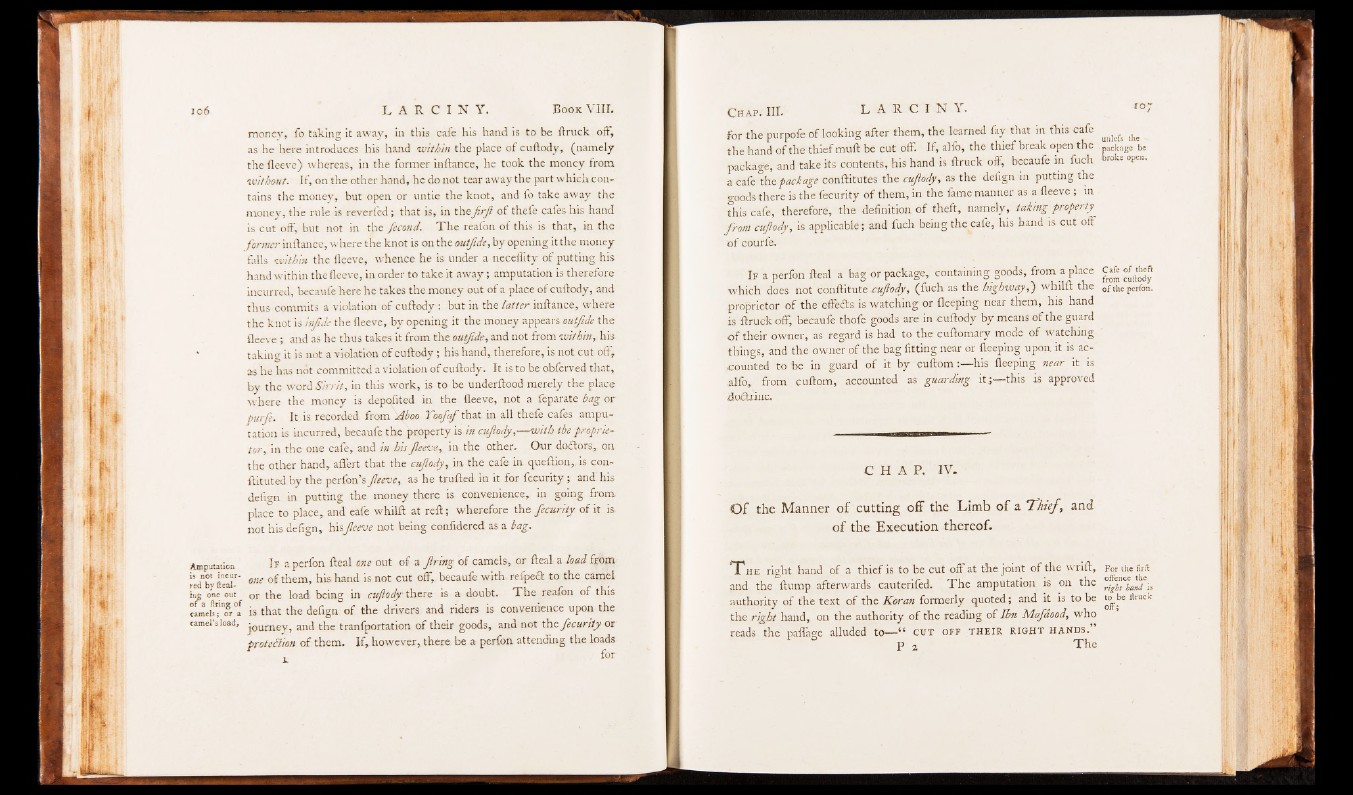
money, fo taking it away, in this cafe his hand is to be ftruck off,
as he here introduces his hand within the place of cuftody, (namely
the fleeve} whereas, in the former inftance, he took the money from
•without. If, on the other hand, he do not tear away the part which contains
the money, but open or untie the knot, and fo take away the
money, the rule is reverfed; that is, in theJirJi of thefe cafes his hand
is cut off, but not in the fecond. The realon of this is that, in the
former inftance, where the knot is on the outfide, by opening it the money
tails within the fleeve, whence he is under a neceffity of putting his
hand within the fleeve, in order to take it away; amputation is therefore
incurred, becaufe here he takes the money out of a place of cuftody, and
thus commits a violation of cuftody : but in the tatter inftance, where
the knot is infids the fleeve, by opening it the money appears outfide the
fleeve ; and as he thus takes it from the outfide, and not from within, his
taking it is not a violation of cuftody; his hand, therefore, is not cut oft,
as he has not committed a violation of cuftody. It is to be obferved that,
by the word Sir fit, in this work, is to be underftood merely the place
where the money is depofited in the fleeve, not a feparate bag or
purfe. It is recorded from Aboo Toofaf that in all thefe cafes amputation
is incurred, becaufe the property is in cuftody,— with the proprietor,
in the one cafe, and in his fleeve, in the other. Our doctors, on
the other hand, aflert that the cuftody, in the cafe in queftion,. is con-
ftituted by the performs fleeve, as he trufted in it for fecurity ; and his
defivn in putting the money there is convenience, in going from
place to place, and eafe whilft at reft; wherefore the fecurity of it is,
not his defign, hisfleeve not being confidered as a bag.
Amputation If a perfon fteal one out of a firing of camels, or fteal a load item
redb' fteal"" ene of them, his. hand is not cut off, becaufe with refpeft to the camel
ing one out or the load being in cuftody there is a doubt. T h e reafon of this
camek?nor°a is that the defign of the drivers and riders is convenience upon the
camel’s load, journey, and the tranfportation of their goods, and not the fecurity or
protection of them. If, however, there be a perfon attending the loads
, for
for the purpofe of looking after them, the learned fay that in this cafe
the hand of the thief muft be cut off. If, alfo, the thief break open the
package, and take its contents, his hand is ftruck off^ becaufe in fuch
a cafe the package conftitutes the cuftody, as the defign in putting the
goods there is the fecurity of them, in the fame manner as a fleeve ; in
This cafe, therefore, the definition of theft, namely, taking property
from cuftody, is applicable; and fuch being the cafe, his hand is cut off
of courfe.
If a perfon fteal a bag or package, containing goods, from a place
which does not conftituteatflody, (fuch as the highway,) whilft the
proprietor of the effefts is watching or fleepin-g near them, his hand
is ftruck off, becaufe thofe goods are in cuftody by means of the guard
o f their owner, as regard is had to the cuftomary mode of watching
things, and the owner of the bag fitting near or fleeping upon it is accounted
to fee in guard of it by cuftom :— his fleeping near it is
alfo., from cuftom, accounted as guarding it ;— this is approved
dodtrine.
C H A P . IVO
f the Manner o f cu ttin g o ff the L im b o f a Thief, and
o f the E x e cu tion th e reof.
T he right hand of a thief is to be cut off at the joint of the wrift,
and the ftump afterwards cauterifed. T h e amputation is on the
authority of the text of the Koran formerly quoted; and it is to be
the right hand, on the authority of the reading of Ibn Mafaood, who
reads the callage alluded to— 9 cut off their right hands.
P 2 T h e
unlefs the &
package be
broke open.
Cafe o f theft
from cuftody
o f the perfon.
For the firft
offence the
right hand, is
to be ftruck
off;